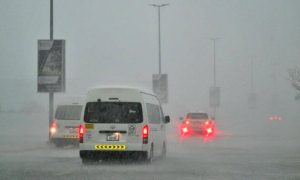According to a new study, global warming has caused temperatures to rise in water bodies. Consequently, it has led to tens of thousands of marine species to fleet the ocean away from the equator to ones with cooler water temperature.
According to a study conducted by researchers of the University of Auckland, nearly 50,000 species of aquatic life including fish, mollusks, birds, and corals reefs have moved towards the pole since 1955.
WHY IS MARINE LIFE FLEETING AWAY FROM THE EQUATOR?
The equator water is known to be the home to the richest diversity of aquatic life on earth. On the contrary, the population decreases as one moves towards the poles.
However, global warming and climate change is the biggest reason causing such migration. According to the research, the tropical water along the equator has already become too hot for many species. This rise in water temperature is posing survival challenges to these animals, causing them to move away in large numbers.
IMPACT ON MARINE LIFE
The change in temperature and climate is posing danger to the marine ecosystem. Coral reefs that are of utmost importance for aquatic life have been affected. In the last four decades, 85% of tropical reefs have deviated from their place.
Planktons too, an important species for foodweb, has been dropping. During the summer season, lesser and lesser fishes are seen on the surface of the water near the reef.
Moving towards the poles would also mean increased challenges and competition for survival and adaptation. It would also mean loss of habitat and food. The implications could also mean ecosystem collapse.
WHAT/WHO IS TO BE BLAMED?
It is no surprise that excessive human interference in nature has caused an imbalance in the ecology. Increased activities have led to global warming and climate changes, resulting in changes in biodiversity.
Overfishing for livelihood is one of the major reasons that has caused a dip in the population of fishes along the equator.
In addition to this, water pollution has become another cause of concern for these animals.
STATE OF INDIAN WATER AND MARINE LIFE?
According to a study conducted by scientist Roxy Mathew Koll from the Indian Institute of Tropical Meteorology, Pune, the ocean surface warming in the Indian Ocean has increased by 1.2 degree celsius in the past century.
India’s ocean too are witnessing the same phenomenon, with fishes migrating from warm tropical waters to cool north waters.
Similarly, the population of phytoplankton has also gone down by 20% in the last six decades. Due to rapid warming of the water, in the western Indian Ocean, there was a 30% decline in phytoplankton population in the last 16 years.
According to the Marine Fish Landings Report 2019, the impact of climate change can be witnessed on the Indian water and the marine life based in it.
Due to water pollution, climate change and loss of phytoplankton population, fish catch in the western coast has declined too.
The increase in greenhouse gases has increased heat. 90% of this extra heat is absorbed by oceans and has pushed marine ecosystem towards danger.
WHAT DOES IT MEAN FOR THE FUTURE?
The future looks grim if no step is taken to slow down or at least reverse the impact of climate change. For marine life, the rise in temperature and climate change could lead to the mass extinction of several species. 252 million years ago, when this same thing happened, 90% of the marine species died.
As for human beings, this migration of aquatic animals could lead to loss of livelihood as many depend on these animals for a living. Tourism may decline, exports and trade may get affected.
Climate change is real, is happening now and disrupting everything that is coming in its path.




























 WhatsApp us
WhatsApp us
Pingback: situs togel gacor
Pingback: view it